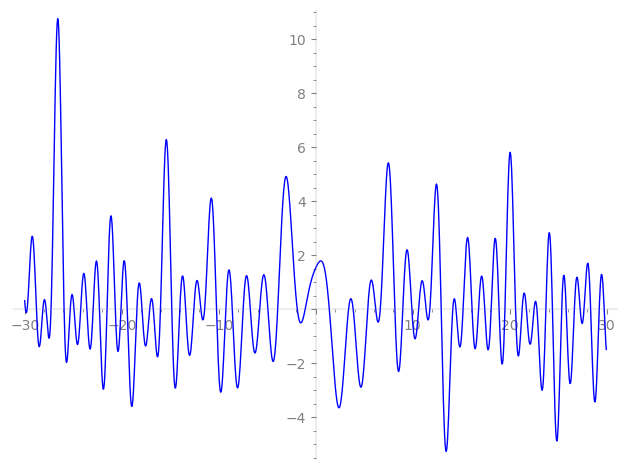| L(s) = 1 | + (−1.10 − 1.33i)3-s + (0.792 − 2.09i)5-s + (1.05 − 0.283i)7-s + (−0.548 + 2.94i)9-s + (5.44 + 3.14i)11-s + (3.34 + 0.896i)13-s + (−3.66 + 1.25i)15-s + (3.14 − 3.14i)17-s − 1.55i·19-s + (−1.55 − 1.09i)21-s + (−0.258 + 0.965i)23-s + (−3.74 − 3.31i)25-s + (4.53 − 2.53i)27-s + (−1.57 + 2.72i)29-s + (−2.22 − 3.85i)31-s + ⋯ |
| L(s) = 1 | + (−0.639 − 0.769i)3-s + (0.354 − 0.935i)5-s + (0.400 − 0.107i)7-s + (−0.182 + 0.983i)9-s + (1.64 + 0.948i)11-s + (0.928 + 0.248i)13-s + (−0.945 + 0.325i)15-s + (0.763 − 0.763i)17-s − 0.355i·19-s + (−0.338 − 0.239i)21-s + (−0.0539 + 0.201i)23-s + (−0.748 − 0.663i)25-s + (0.872 − 0.487i)27-s + (−0.292 + 0.505i)29-s + (−0.399 − 0.692i)31-s + ⋯ |
Λ(s)=(=(720s/2ΓC(s)L(s)(0.348+0.937i)Λ(2−s)
Λ(s)=(=(720s/2ΓC(s+1/2)L(s)(0.348+0.937i)Λ(1−s)
| Degree: |
2 |
| Conductor: |
720
= 24⋅32⋅5
|
| Sign: |
0.348+0.937i
|
| Analytic conductor: |
5.74922 |
| Root analytic conductor: |
2.39775 |
| Motivic weight: |
1 |
| Rational: |
no |
| Arithmetic: |
yes |
| Character: |
χ720(497,⋅)
|
| Primitive: |
yes
|
| Self-dual: |
no
|
| Analytic rank: |
0
|
| Selberg data: |
(2, 720, ( :1/2), 0.348+0.937i)
|
Particular Values
| L(1) |
≈ |
1.25455−0.871609i |
| L(21) |
≈ |
1.25455−0.871609i |
| L(23) |
|
not available |
| L(1) |
|
not available |
L(s)=p∏Fp(p−s)−1 | p | Fp(T) |
|---|
| bad | 2 | 1 |
| 3 | 1+(1.10+1.33i)T |
| 5 | 1+(−0.792+2.09i)T |
| good | 7 | 1+(−1.05+0.283i)T+(6.06−3.5i)T2 |
| 11 | 1+(−5.44−3.14i)T+(5.5+9.52i)T2 |
| 13 | 1+(−3.34−0.896i)T+(11.2+6.5i)T2 |
| 17 | 1+(−3.14+3.14i)T−17iT2 |
| 19 | 1+1.55iT−19T2 |
| 23 | 1+(0.258−0.965i)T+(−19.9−11.5i)T2 |
| 29 | 1+(1.57−2.72i)T+(−14.5−25.1i)T2 |
| 31 | 1+(2.22+3.85i)T+(−15.5+26.8i)T2 |
| 37 | 1+(3+3i)T+37iT2 |
| 41 | 1+(3.39−1.96i)T+(20.5−35.5i)T2 |
| 43 | 1+(0.896+3.34i)T+(−37.2+21.5i)T2 |
| 47 | 1+(2.32+8.69i)T+(−40.7+23.5i)T2 |
| 53 | 1+(−6.61−6.61i)T+53iT2 |
| 59 | 1+(−5.90−10.2i)T+(−29.5+51.0i)T2 |
| 61 | 1+(−2.72+4.71i)T+(−30.5−52.8i)T2 |
| 67 | 1+(0.978−3.65i)T+(−58.0−33.5i)T2 |
| 71 | 1+0.635iT−71T2 |
| 73 | 1+(−2.89+2.89i)T−73iT2 |
| 79 | 1+(2.12+1.22i)T+(39.5+68.4i)T2 |
| 83 | 1+(−0.531+0.142i)T+(71.8−41.5i)T2 |
| 89 | 1+2.36T+89T2 |
| 97 | 1+(−10.7+2.89i)T+(84.0−48.5i)T2 |
| show more | |
| show less | |
L(s)=p∏ j=1∏2(1−αj,pp−s)−1
Imaginary part of the first few zeros on the critical line
−10.23084538520184278275259126385, −9.272493941762794124561985412105, −8.601245977567894423327363144588, −7.48050480391426009165806767622, −6.74109468099192778747557768988, −5.77212304504437341149225672687, −4.92793852246534286196181039502, −3.91931703893039862341005045040, −1.90167968012703380951272818188, −1.08388334578722462950625355891,
1.40001341998620602543489607870, 3.38560982027414113342567854533, 3.85920943645874940210307653602, 5.35570501066652036097349244571, 6.18054489515975045897298305336, 6.65442490233123946395454229886, 8.153022016405837514825485963616, 8.975361609142908143903474006617, 9.906573231578370639008988589306, 10.60595857366989085188840666337

